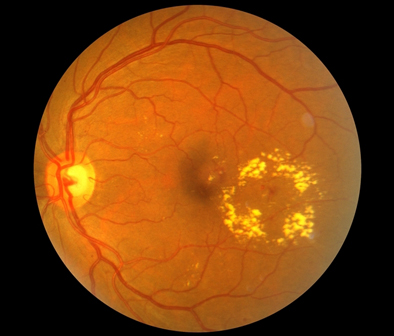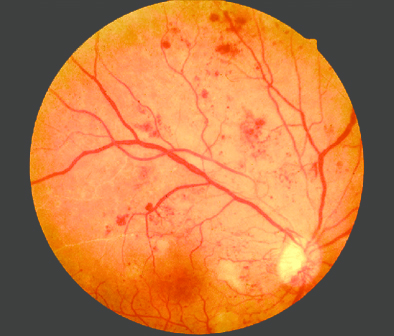The doctor told me that I have mild retina damage due to my diabetes. Can I completely cure myself?
Controlling your blood sugar can prevent further damage to the retina. But, it most likely will not reverse the damage that has already occurred. You will need to be treated to stop the retina damage from progressing. This damage is linked to how well your diabetes is controlled. So, while controlling your blood sugar may not be a cure, it can help slow the disease.
I have had diabetes for 1 year. Will it affect my eyes?
It’s hard to say. Strict blood sugar control is a must, but it may not be enough. For this reason, all diabetics should get an eye screening every year.
How can I prevent Diabetic Retinopathy?
It can be prevented by controlling your diabetes. You must also control your blood pressure and cholesterol levels. Regular checkups with your primary care physician and an eye doctor are necessary for prevention.
I am diabetic. What can I do to protect my vision?
The best way to control a diabetic eye disease is to find and treat it early. Even if you control your diabetes, your eyes are still at risk. The ONLY way to protect your vision is by getting your eyes checked every year.
Can diabetes cause bleeding inside the eye?
Yes. This is actually an important sign of Diabetic Retinopathy. In early stages, there is very little bleeding. But in the later stages, new fragile blood vessels grow in the retina. These vessels are so weak that blood may bleed out of the blood vessels into the surrounding fluid. This can cause cloudy vision.
How can diabetes affect my eye?
If you have diabetes, your body does not use and store sugar properly. This can damage the small blood vessels in the retina. The retina is the light-sensitive tissue that helps detect images and send them to the brain. So, when it is damaged, vision is greatly affected.
If I get vitrectomy surgery to fix a retinal detachment, will I regain my vision fully?
It depends. If the center of the retina was damaged or if the detachment was only treated in a later stage, complete visual recovery cannot be guaranteed. But, there is a chance that your vision will gradually improve.
Will I have any side effects from the silicon oil in my eye?
A few patients might experience double vision. This improves after the oil is removed (3-4 months after surgery).
What will happen if the silicon oil is left in the eye?
There is a high chance that cataracts will form. The eye pressure can also increase, causing nerve damage and eye pain.
Can I have a gas injection? I don’t want silicon oil because I have to get another surgery to remove it.
That decision can only be made by a surgery. Based on the condition of your eye, one option might be better than the other. It is better to use the filling that is best for your eye health than to try and avoid another surgery.
What will happen if I choose to not get the Vitrectomy Surgery?
The retinal detachment will progress. You may lose your vision completely as the retina becomes more damaged. You can also develop cataract. If you have uveitis or glaucoma, you may experience eye pain. In the long run, your eyes might even shrink.
Surgery offers a chance to improve your sight. Without it, your eyes will only get worse.
How many days will I stay in the hospital?
You will stay for 2-3 days after the surgery.
How many days will I have to tilt my head and lie on my stomach?
For 7-15 days.
How long will I spend in the recovery area after Vitrectomy Surgery?
This will vary depending on how you feel and the duration of the surgery. At Aravind, patients usually spend 1-3 hours in the recovery room.
Will I be able to regain complete vision after undergoing laser treatment?
Laser treatment for Diabetic Retinopathy will prevent the progression of the disease. In some cases, vision may also improve slightly. Typically, vision that is lost to Diabetic Retinopathy cannot be restored. So, the longer the treatment is delayed, the higher the chance of permanently losing vision.
Do I have to get laser treatment multiple times?
This depends on your eye’s response to the first laser treatment. Your doctor will decide if it is needed. Unfortunately, if the retina problem comes back, then another round of laser treatment may be required.
How common are the side effects of laser treatment?
Laser treatment is a very safe procedure. Both the side effects and the possible complications are extremely rare.
Can I bathe and go to work after laser treatment?
Yes, you can perform all your daily activities as you normally do.
Will I experience pain during laser treatment?
No. During laser treatment, your eye will be numbed so you don’t feel any pain. A few patients may experience mild pain, but this only lasts for 3-4 hours. These patients may use eye drops to reduce the pain.
I have myopia (near-sighted) and I am already using spectacles. The doctor told me I have a retinal hole and will have to get laser treatment. Is this necessary?
Yes. Laser treatment can close the hole. This prevents retinal detachment.
Do I have to come back for check-ups after laser treatment?
Yes. You should have a regular check-up in the retinal clinic at least once a year. This will allow doctors to see how well the treatment is working. It can also help them see if any new retinal damage has occurred.
Will I be able to regain complete vision after the Intravitreal injection?
Intravitreal injections are used to treat many diseases that cause irreversible vision loss. They mainly work by preventing further damage. Your vision may improve slightly in some cases, but there is no guarantee.
Do I have to undergo Intravitreal injection many times?
It depends on your response to the first injection treatment. If the retina problem comes back, then a repeat injection may be required.
I have been advised to get an injection inside my eye. Where will they inject? Will it cause any problems?
Intravitreal injections are given through the white portion of the eye. You will be given anesthetic eye drops, so you should not feel any pain and the injection should not cause any problems.
Are there any side effects?
There are a few, but they are very rare. Injection treatment is a very safe procedure. In fact, you can go home the same day as the treatment.




